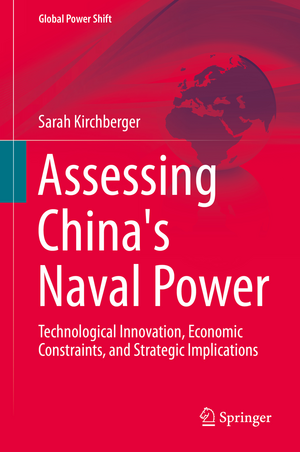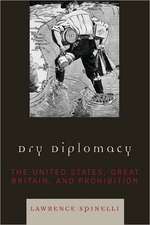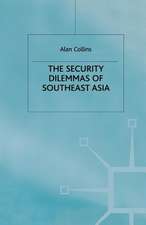Assessing China's Naval Power: Technological Innovation, Economic Constraints, and Strategic Implications: Global Power Shift
Autor Sarah Kirchbergeren Limba Engleză Hardback – 7 iul 2015
Drawing on first-hand working experience in the naval shipbuilding industry, the author provides transparent criteria for the evaluation of different naval technologies’ strategic value, which other researchers can draw upon as a basis for further research in such diverse fields as International Security Studies, Naval Warfare Studies, Chinese Studies, and International Relations.
| Toate formatele și edițiile | Preț | Express |
|---|---|---|
| Paperback (1) | 698.94 lei 6-8 săpt. | |
| Springer Berlin, Heidelberg – 18 oct 2016 | 698.94 lei 6-8 săpt. | |
| Hardback (1) | 705.34 lei 6-8 săpt. | |
| Springer Berlin, Heidelberg – 7 iul 2015 | 705.34 lei 6-8 săpt. |
Din seria Global Power Shift
-
 Preț: 357.43 lei
Preț: 357.43 lei - 15%
 Preț: 642.51 lei
Preț: 642.51 lei - 20%
 Preț: 557.46 lei
Preț: 557.46 lei - 20%
 Preț: 569.00 lei
Preț: 569.00 lei - 15%
 Preț: 644.30 lei
Preț: 644.30 lei - 15%
 Preț: 640.71 lei
Preț: 640.71 lei - 18%
 Preț: 999.73 lei
Preț: 999.73 lei - 18%
 Preț: 1114.96 lei
Preț: 1114.96 lei - 15%
 Preț: 640.02 lei
Preț: 640.02 lei - 18%
 Preț: 1126.35 lei
Preț: 1126.35 lei - 18%
 Preț: 2088.15 lei
Preț: 2088.15 lei - 15%
 Preț: 702.54 lei
Preț: 702.54 lei - 15%
 Preț: 646.11 lei
Preț: 646.11 lei - 15%
 Preț: 698.47 lei
Preț: 698.47 lei - 18%
 Preț: 896.21 lei
Preț: 896.21 lei - 15%
 Preț: 698.62 lei
Preț: 698.62 lei - 18%
 Preț: 779.89 lei
Preț: 779.89 lei - 15%
 Preț: 691.76 lei
Preț: 691.76 lei - 15%
 Preț: 699.59 lei
Preț: 699.59 lei - 15%
 Preț: 692.24 lei
Preț: 692.24 lei - 18%
 Preț: 721.51 lei
Preț: 721.51 lei - 18%
 Preț: 729.84 lei
Preț: 729.84 lei -
 Preț: 381.98 lei
Preț: 381.98 lei - 18%
 Preț: 779.39 lei
Preț: 779.39 lei - 18%
 Preț: 783.98 lei
Preț: 783.98 lei - 18%
 Preț: 733.46 lei
Preț: 733.46 lei - 24%
 Preț: 602.56 lei
Preț: 602.56 lei - 18%
 Preț: 786.84 lei
Preț: 786.84 lei -
 Preț: 455.12 lei
Preț: 455.12 lei - 9%
 Preț: 789.77 lei
Preț: 789.77 lei
Preț: 705.34 lei
Preț vechi: 829.80 lei
-15% Nou
Puncte Express: 1058
Preț estimativ în valută:
134.97€ • 147.07$ • 113.73£
134.97€ • 147.07$ • 113.73£
Carte tipărită la comandă
Livrare economică 23 aprilie-07 mai
Preluare comenzi: 021 569.72.76
Specificații
ISBN-13: 9783662471265
ISBN-10: 3662471264
Pagini: 250
Ilustrații: XX, 318 p. 51 illus., 15 illus. in color.
Dimensiuni: 155 x 235 x 25 mm
Greutate: 0.65 kg
Ediția:2015
Editura: Springer Berlin, Heidelberg
Colecția Springer
Seria Global Power Shift
Locul publicării:Berlin, Heidelberg, Germany
ISBN-10: 3662471264
Pagini: 250
Ilustrații: XX, 318 p. 51 illus., 15 illus. in color.
Dimensiuni: 155 x 235 x 25 mm
Greutate: 0.65 kg
Ediția:2015
Editura: Springer Berlin, Heidelberg
Colecția Springer
Seria Global Power Shift
Locul publicării:Berlin, Heidelberg, Germany
Public țintă
ResearchCuprins
1 Introduction.- 2 Naval Power and Its Role in China's Rise.- 3 Comparing Naval Capability and Estimating the Cost Impact.- 4 Producing Naval Weapon Systems: The Industrial Basis of Naval Power.- 5 The PLA Navy's Capability Profile.- 6 Strategic Implications of China's Naval Build-Up.- 7 Concluding Remarks and Summary of Results.
Recenzii
“It is a powerful contribution to the debate on the military capacity of China and a precious source of information for all scholars and analysts dealing with security issues in Asia. This book bears a great value as a realistic global assessment of PLAN’s current naval capability, based on an impressively comprehensive analytical framework. Ultimately, the author succeeds in her endeavour to provide convincing arguments for diminishing the fear of PLAN, the ‘monster’ we are afraid of.” (Raymond Yamamoto, Journal of Asian Security and International Affairs, Vol. 4 (1), 2017)
Notă biografică
Sarah Kirchberger is an Assistant Professor of Contemporary China Studies at the Asia-Africa-Institute (AAI), University of Hamburg. A former analyst with shipbuilder Blohm + Voss, she holds an MA and a PhD in Sinology. Her publications include a book on informal politics in China and Taiwan and various articles and book chapters on China’s political system, political history, domestic politics, foreign policy, and naval modernization.
Textul de pe ultima copertă
This book analyzes the rise of China’s naval power and its possible strategic consequences from a wide variety of perspectives – technological, economic, and geostrategic – while employing a historical-comparative approach throughout. Since naval development requires huge financial resources and mostly takes place within the context of transnational industrial partnerships, this study also consciously adopts an industry perspective. The systemic problems involved in warship production and the associated material, financial, technological, and political requirements currently remain overlooked aspects in the case of China.
Drawing on first-hand working experience in the naval shipbuilding industry, the author provides transparent criteria for the evaluation of different naval technologies’ strategic value, which other researchers can draw upon as a basis for further research in such diverse fields as International Security Studies, Naval Warfare Studies, Chinese Studies, and International Relations.
Drawing on first-hand working experience in the naval shipbuilding industry, the author provides transparent criteria for the evaluation of different naval technologies’ strategic value, which other researchers can draw upon as a basis for further research in such diverse fields as International Security Studies, Naval Warfare Studies, Chinese Studies, and International Relations.
Caracteristici
Demonstrates a practical methodological approach for analyzing naval developments in China and anywhere in the world In-depth assessments of China's domestic and foreign policy concerns Drawing on personal work experience in the naval shipbuilding industry Makes the domestic Chinese discourse accessible to the Western reader by analyzing various Chinese-language sources Includes supplementary material: sn.pub/extras
























